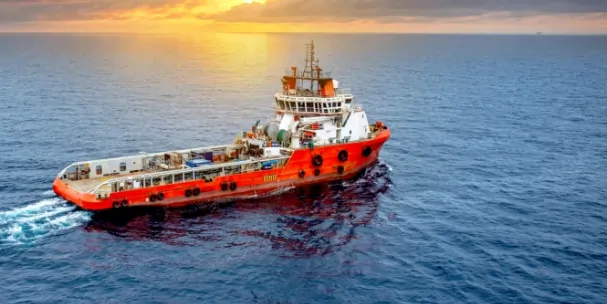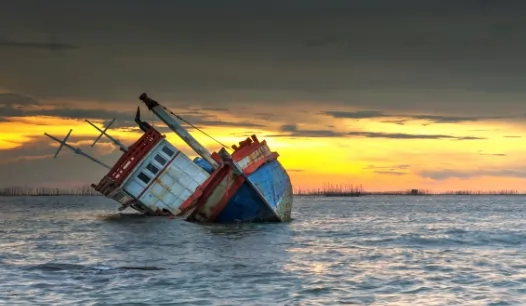

The Shlosman Law Firm has years of experience representing maritime workers and seamen injured.
Get Your Free ConsultationThe most famous example is the 2010 Deepwater Horizon explosion and oil spill that killed 11 people and affected thousands across the entire Gulf Coast. Seamen and workers who are injured or killed while working aboard barges, tugboats, supply vessels, oil rigs/platforms, crew boats and other vessels are eligible to sue their employers and others responsible under the Jones Act, which is maritime law. It is vital that you hire a highly skilled and knowledgeable New Orleans maritime lawyer if you have been injured or a loved one has died in a maritime related accident.

Seamen and workers who are injured or killed while working aboard barges, tugboats, supply vessels, oil rigs/platforms, crew boats and other vessels are eligible to sue their employers and others responsible.
The Jones Act holds the employer or the vessel owner liable for any injury that happened as a result of the negligence on their part and provides the injured employee the right to sue the owner for damages. Jones Act lawsuits are substantially different from general state negligence claims. This is why you need to contact a New Orleans Jones Act lawyer to help navigate through the intricacies of the Jones Act. Our New Orleans maritime attorneys have the knowledge and experience you need. Maritime Law is a specialized area of the law. Hire a New Orleans maritime attorney that has a proven track record and has a deep understanding of this area of law.
The lawyers at Shlosman Law Firm are licensed to practice before: the Louisiana Supreme Court, all lower state courts, the federal courts representing the Eastern, Western and Middle Districts of Louisiana, and the United States Fifth Circuit Court of Appeals.
Whether you were injured on an inland waterway between Lake Charles and Lake Pontchartrain, on the Mississippi River, or on the Gulf Coast, the lawyers at Shlosman Law Firm stand ready to fight for your rights. Unlike most New Orleans personal injury attorneys, Mr. Shlosman, a proven New Orleans maritime lawyer, regularly handles Maritime Personal Injury cases. He is very familiar with the intricacies of this distinctive area of law.
Learn More About Our FirmMaritime accidents can lead to all types of injuries. If you’ve been injured offshore, obtaining an accurate diagnosis will be critical for ensuring that you get the treatment you need. But, it is also important to understand that the nature of your injury does not have any bearing on your legal rights. The Jones Act covers all types of injuries, and New Orleans maritime injury attorney Tom Shlosman and his team of lawyers represent workers who have suffered all types of injuries on the job.
In a maritime setting, certain types of injuries are particularly common. For example, workers onboard barges, tugboats, supply vessels, rigs and platforms, cargo ships, cruise ships, and other vessels regularly suffer injuries.
Again, these are just examples of some of the most common types of injuries that occur in a maritime setting. No matter what type of injury you have suffered, if you were injured on or around water, you should talk to a New Orleans maritime accident lawyer about your legal rights as soon as possible.

Maritime law is widely different from personal injury law. Be sure to work with a maritime lawyer - not just a personal injury lawyer who dabbles in maritime law.
What are your legal rights after a maritime accident? This is an important question, and it is one you should not rely on your employer to answer. Unfortunately, companies don’t always have their employees’ best interests in mind, and if you ask your employer what you should do, you might not get the advice you need. Your employer is only going to try and protect the company.
Since maritime accidents often occur offshore, they are not governed by the laws that protect land-based workers. Instead, when you get injured on the job, your legal rights are often governed by the Jones Act. Under the Jones Act, injured maritime workers who qualify as “seamen” can file one (or more) the following types of claims:
Virtually all offshore workers who qualify as “seamen” under the Jones Act can file for maintenance and cure benefits when they get injured on the job. These are “no-fault” benefits, which means you can file...
Virtually all offshore workers who qualify as “seamen” under the Jones Act can file for maintenance and cure benefits when they get injured on the job. These are “no-fault” benefits, which means you can file a claim even if your employer isn’t at fault for your injury. But, since maintenance and cure benefits are limited (they only cover medical expenses and a small portion of injured seamen’s lost wages), it will be important to speak with a New Orleans maritime accident lawyer about your other legal rights as well. Additionally, despite the fact that employers are supposed to pay maintenance and cure irrespective of fault, many companies fight offshore workers’ claims for these benefits as well.
If your employer is at fault for your injury, you may also be able to file a claim for Jones Act negligence. If you have a negligence claim under the Jones Act, a New Orleans...
If your employer is at fault for your injury, you may also be able to file a claim for Jones Act negligence. If you have a negligence claim under the Jones Act, a New Orleans maritime injury attorney can seek full compensation for all of your injury-related losses. This includes full lost wages, pain and suffering, and all other forms of financial and non-financial harm—both that you have suffered to date and that you will suffer in the future.
If you got hurt because the vessel on which you were working was unseaworthy, you may be able to seek full compensation for your losses based on the vessel’s “unseaworthiness” as well. Several factors can...
If you got hurt because the vessel on which you were working was unseaworthy, you may be able to seek full compensation for your losses based on the vessel’s “unseaworthiness” as well. Several factors can make a vessel unseaworthy, from inadequate maintenance and dangerous equipment to a lack of adequate safety gear onboard. Similar to proving Jones Act negligence, proving unseaworthiness requires evidence of liability, so it is important to hire a New Orleans maritime injury attorney to investigate and preserve the available evidence before it disappears.
As we mentioned, the Jones Act only protects offshore workers who qualify as “seamen.” So, how do you know if you qualify as a “seaman”?
Under the Jones Act, a seaman is anyone who spends a significant amount of their workdays onboard a vessel on the water. If you work on a barge, cargo ship or any of the other vessels we listed above, you almost certainly qualify. With that said, when it comes to protecting your legal rights, you should not make any assumptions, and it is best to contact a New Orleans maritime accident lawyer for advice about your situation as soon as possible.
EXCELLENT
Whether you have a claim (or claims) under the Jones Act or you have a claim under any other law that protects workers who get injured on the job, there are steps you need to take to protect your legal rights. For example, you should generally take the following steps as soon as you can:

If you have a Jones Act claim, you will need to report your accident in order to protect your legal rights. If you are still onboard your vessel (or still on your rig or platform), you should notify your supervisor or the captain promptly. When you do so, you may be asked to fill out an accident report form, and if so, you should complete the form as fully and accurately as possible.

Before you submit your accident report, take a photo with your phone so you have a copy (unless it’s already too late, in which case your attorney can obtain a copy for you). From this point forward, you will want to do everything you can to document your accident and its effects. Take photos and videos of the location where you were injured if you can, photograph your injuries, and write down as many details as you can remember about the accident.

You should see a doctor as soon as possible—not only for your health but also for your legal rights. The sooner you seek treatment after your accident, the easier it will be to prove how and when you got injured. While you can see your ship’s doctor for immediate treatment if necessary, you should see your own doctor once you get back to land. You have the right to choose your own doctor under the Jones Act.

Regardless of the circumstances surrounding your accident, you will want to talk to a New Orleans maritime injury attorney about your legal rights. Filing a successful Jones Act claim isn’t easy, and if you have a claim for Jones Act negligence or unseaworthiness, you will need a lawyer to prove your claim and calculate the financial compensation you are entitled to recover.

Once you speak with an attorney, you should follow your attorney’s advice. Your attorney will have your best interests in mind, and your attorney will want to help you do everything necessary to maximize your financial recovery.
Navigating the legal waters of maritime law requires a unique set of skills and experience, setting it apart from typical personal injury cases (like car accidents, slip & falls, etc.). The maritime industry is one of the world’s most dangerous industries, with a high rate of accidents and fatalities. It is also one of the more complex areas of law.
The distinctiveness of the laws, coupled with its potential dangers, underscores the critical importance of experience in handling maritime personal injury cases. Unlike other personal injury scenarios, maritime law demands a seasoned professional who not only comprehends the legal intricacies but also appreciates the unique hazards associated with maritime work. For an injured maritime worker seeking justice, the choice of legal representation becomes a pivotal decision. It is imperative to secure the services of an experienced maritime personal injury lawyer who can skillfully navigate the complexities inherent in this specialized field.
In addition to taking these steps (along with the additional steps your attorney recommends), you also need to be careful to avoid some costly mistakes after getting injured on the job. For example, here are five mistakes to avoid when you have a maritime injury claim:
From reporting your accident and seeking treatment to talking with an attorney, you should not wait any longer than necessary to take any of the steps we discussed above. Unnecessary delays can prove costly, and if you wait too long, you could lose your ability to pursue a claim entirely.
While you can rely on your friends and family for emotional support, you should not rely on them for legal advice. Maritime law is complicated, and even most lawyers don’t have a firm grasp of how the law applies. To ensure that you are making informed decisions, you need to rely on the advice of an experienced New Orleans maritime accident lawyer.
Many offshore workers assume that they are only eligible for maintenance and cure benefits. As a result, they end up trying to cover the costs of their injuries without recovering the full financial compensation they deserve. When you get injured on the job, it is important not to make any assumptions but instead to make informed decisions based on the advice of an experienced attorney.
When you are suffering from a job-related injury, you need to avoid letting your employer take control of your recovery. This applies to your treatment and your claim (or claims) under the Jones Act. If you let your employer tell you where to go for treatment, your doctor might be more focused on getting you back to work than providing the most comprehensive treatment possible. If you let your employer decide how much compensation to pay for your injury, you unfortunately only stand a small chance of recovering the full compensation you deserve. The sad truth is that maritime companies are only concerned with the company’s bottom line and are not concerned with your recovery or your family’s needs.
This brings us to our last mistake to avoid: Trying to handle your situation on your own. Again, it is critical to ensure that you are making informed decisions, and the only way to do this is by putting an experienced lawyer on your side. At the Shlosman Law Firm, we handle all maritime and offshore injury cases on contingency fee based contracts, which means you pay nothing unless you win.
Along with avoiding these mistakes (among many others), there are many other reasons to hire a New Orleans maritime injury attorney to help after getting injured on the job. For example, when you hire the lawyers at Shlosman Law Firm to represent you:
Our lawyers will carefully examine the facts of your case to determine if you qualify as a seaman; and, if so, whether you have a claim for negligence or unseaworthiness under the Jones Act. We will use our experience investigating offshore accidents to gather the evidence needed to prove your legal rights.
In addition to assessing your legal rights under the Jones Act, our maritime lawyers will determine if you have any other claims as well. For example, if your accident involved a defective tool, piece of heavy equipment, or offshore safety gear, you may have a product liability claim against the manufacturer.
Regardless of the type of claim (or claims) you can file, you need to know how much you are entitled to recover. Our legal team will work closely with you, your doctors and financial experts as necessary to calculate the full financial and non-financial costs of your offshore or maritime injury case. This includes any costs you are likely to incur in the future.
From establishing your eligibility under the Jones Act to making sure you receive the full compensation you deserve, we can deal with your employer and the insurance companies for you. This will help you avoid costly mistakes, and if your employer or any of the insurance companies handle your claim in bad faith, we can hold them accountable under the law.
When you have a maritime injury claim, the best-case outcome is to secure a favorable settlement in most scenarios. Our team will use our experience to negotiate a favorable settlement on your behalf. But, know we will also prepare to take your claim to court if necessary, and under no circumstances will we recommend that you settle for less than you deserve. If the company does not pay what your case is worth we will try your case.
If you were injured on an oceangoing vessel, you are probably ineligible to file a workers compensation claim. Instead, you will need to seek compensation under federal maritime law.
Maritime law, otherwise known as admiralty law, is the type of law that governs activities at sea or in navigable waters. Where it applies, its jurisdiction is exclusive. Under certain circumstances, maritime law even includes international laws and treaties.
The Jones Act, otherwise known as the Merchant Marine Act of 1920, provides a system of remedies for “seamen” suffering personal injury (among other provisions). Employees covered by the Jones Act are not covered by the workers’ compensation system. There are significant differences between the Jones Act compensation system, workers’ compensation, and ordinary personal injury law. It is important to hire an experienced New Orleans maritime attorney who can fight by your side.
The following terms are useful and, in some cases, critically important:
You can file a Jones Act claim in either state or federal court. If you file in state court, you run the risk that the defendant might remove the lawsuit to federal court. If you file in federal court, however, the defendant cannot remove the lawsuit to state court.
At a minimum, you will need to prepare the following:
Use your own doctor, and avoid seeing the company doctor. You do not have to see the company doctor, no matter what your employer might tell you. Remember, once you are injured, the company doctor works for the company, not you. Under no circumstances should you neglect seeking medical treatment, however, because you will need it to generate evidence of your injury. If you have a specific question in regards to your treatment and case, consult with our New Orleans offshore injury attorney that is knowledgeable about Maritime Law.
The general rule is that you have until three years after the accident to file a lawsuit under the Jones Act, but under no circumstances should you wait that long. Since calculating the statute of limitations in a particular case can get tricky due to legal ambiguities, speak with our New Orleans maritime lawyers on this matter after we have become familiar with the facts of your case.
Many different types of behavior might qualify, including:
If you are not sure whether a specific behavior would count as negligence, consult with our New Orleans maritime injury lawyers and find out.
To win a personal injury claim, you must not only prove negligence – you must also prove that the negligence actually caused the accident. An accident can have more than one cause, of course. In an ordinary personal injury claim, you must prove that negligence was a substantial cause of the accident. In a Jones Act claim, you only have to prove that negligence played some small role in the accident.
The three most important differences are:
If you are unsure about whether to pursue a Jones Act claim or workers’ compensation claim, consult with our New Orleans maritime accident lawyers today.
Maritime law includes several statutes that allow survivors to seek compensation for the victim of a maritime accident, including the Death on the High Seas Act (DOHSA). Certain close relatives of the deceased victim may file a wrongful death lawsuit against the responsible party.
No, you shouldn’t. Employers, advised by their lawyers, have many tricks that they can use to trick you into saying something that they can use against you. Moreover, if they ask you to sign something, make sure you fully understand it before you sign it. Better yet, have your New Orleans maritime attorney look it over first.
“Maintenance and cure” is a phrase that appears in the Jones Act and represents some of the compensation that an injured seaman qualifies for under the Act. “Maintenance” refers to a basic stipend of funds covering the same food and shelter that the seaman would have received had he been still working on a vessel. “Cure” refers to various forms of medical expenses.
There is no cost to speak with our maritime lawyers. We work on a contingency fee basis, which means if we win money for you the law firm gets a percentage of that award. If no money is won, then no money is paid to the law firm. There is zero risk to call and learn about your legal options.
An out-of-control truck is like a missile rolling down the highway, with equally devastating effects in many cases. Commercial truckers are subject to extensive regulations, the violation of which can form the basis of a personal injury claim. Of course, we also represent truckers injured due to negligent motorists.
Learn MoreCatastrophic injuries often require long-term medical treatment. Because of this, a personal injury claimant must accurately calculate his/her future damages, sometimes even decades into the future. It takes considerable expertise to accurately estimate future medical expenses so that you do not run out of money in years to come.
Learn MoreAuto accidents are perhaps the most common form of personal injury claim. Nevertheless, inadequately represented victims often walk away with far less than the true value of their claims, simply because insurance adjusters are savvy negotiators who bring a bag of tricks to the negotiating table. We won’t fall for their tricks.
Learn MorePersonal injury law covers just about any kind of personal injury that one person’s misconduct inflicts upon another. If you have been injured in the New Orleans area, we stand ready and waiting to help.
Learn MoreSince our New Orleans maritime lawyers do not charge upfront fees, and since your initial consultation is free of charge, feel free to contact us even if you don’t have a penny in your pocket. Unless we win your case, your total legal bill from us will be $0.00. Our legal fees are calculated as a percentage of the amount we win for you, and any percentage of zero is still zero.
Get A Free Case EvaluationIf you or a loved one has been injured while working for a maritime or oil and gas company, or during recreational boating in the New Orleans or Gulf Coast area contact the experienced New Orleans maritime attorneys at the Shlosman Law Firm today. Time is not on your side. In addition to contacting us through our “Contact Us” page, you may email us directly at tom@shlosmanlaw.com or call us at (504) 826-9427.
With your financial future at stake, you simply cannot afford to trust a maritime injury claim to an amateur. Hire the knowledgeable and proven New Orleans maritime lawyers at the Shlosman Law Firm.

4907 Magazine Street
New Orleans, LA 70115
Wait! Injured? Don’t Lose Your Rights.
Waiting to act after a serious injury can risk your case. Get immediate, expert advice from an experienced New Orleans personal injury lawyer now. Your consultation is FREE and confidential.